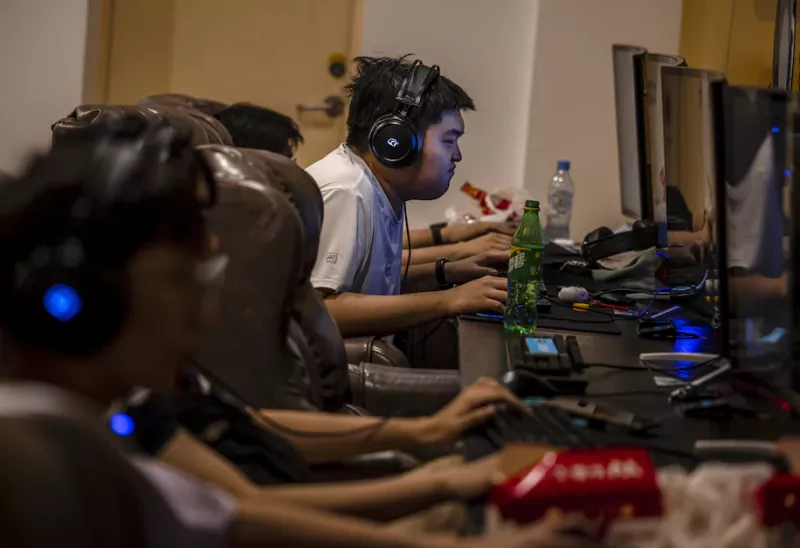
The American entertainment industry has spent years trying to placate the Chinese government to expand its access to the world’s largest market. Companies such as Disney and the National Basketball Association have disgraced themselves by compromising on values such as free speech and human rights in exchange for what they hoped would be boatloads of cash.
Agreeing to censorship in exchange for money is a bad look under any circumstances. As recent developments show, it can also turn out to be a bad bargain.
The buzzy new front in this great-power pop-culture war is the announcement that Chinese President Xi Jinping’s regime is slapping limits on the time minors can spend playing online video games.
Supposedly, this is for children’s benefit. But really it’s the latest salvo in China’s long-running war on gaming, just one front in its efforts to exert social control by regulating pop culture.
The Xi government targeted video gaming in 2018 as a public health issue, blaming the pastime for an increase in childhood myopia. In 2019, the country limited the hours when children were allowed to play games and the money they could spend on in-game microtransactions, and banned everyone from using games that included “sexual explicitness, goriness, violence and gambling”.
More chillingly, the 2019 rules required people to link their gaming handles and real identities, meaning games were no longer safe spaces for unfettered discussion.
That’s a complicated environment in which to do business. But companies based in the United States, and elsewhere, have done their best to accommodate China.
In 2019, U.S. video game giant Blizzard Entertainment banned a prominent “Hearthstone” player from its esports tournaments for a year for the crime of supporting Hong Kong’s protest movement — on the grounds that he violated company rules against offending “a portion or group of the public”. A South Korean video game company automatically bowdlerizes the word “Taiwan” in text chats in one of its popular titles. And the makers of the Taiwanese game “Devotion” pulled their own title from Steam, a major distribution platform, because it included a meme comparing Xi to Winnie the Pooh; the makers said the uproar had “caused immeasurable harm to Red Candle Games and our partner”.
Maybe, from a purely financial perspective, these compromises would be worth it if the result was unrestrained access to China’s huge population of gamers. But negotiating with Chinese regulators is a lot like trying to strike a deal with Darth Vader — the terms get worse all the time.
Cracking down on microtransactions hits at a critical source of revenue for gaming companies. Developing a game only to have to yank it off sale to avoid collateral damage to a company’s other titles and its reputation, as happened with “Devotion”, is a huge sunk cost. And restricting minors’ access to games could help forestall the growth of a new generation of players in China.
The U.S. movie industry has confronted similar questions and been even more craven in its dealings with China — and now faces an even sharper reckoning that should be a warning for other sectors.
These accommodations range from the cheesy to the very ugly. The former category includes a subplot in one of Michael Bay’s “Transformers” movies in which Chinese officials pledge to defend Hong Kong. In the latter was Disney’s decision to thank entities in Xinjiang — the site of China’s massive internment camps for the country’s Uyghur minority — in the credits for the live-action remake of “Mulan”. These rituals are meant to persuade Chinese regulators to let American films into the country.
And to what end? A battered Hollywood may have looked to the Chinese box office as a savior after the country’s crackdown on covid-19 made it possible to open theaters there earlier. But the “Mulan” remake, tailor-made for Chinese audiences, bombed there, and other blockbusters made with expectations of big overseas profits have struggled, too.
And fewer than usual American movies have opened in China in 2021, partly because of shifting release dates in the United States, and partly because the Communist Party locked out foreign releases for longer than usual during commemorations of the 100th anniversary of the party’s founding.
Meanwhile, the box office for Chinese-made movies is booming. The obvious conclusion is that Hollywood let itself get played, accepting censorship and competing fiercely for access to Chinese audiences — all while giving China time to build up domestic competitors to replace the wonders of Tinseltown.
For an industry that prides itself on its savvy and cloaks itself in sanctimonious claptrap about exporting American values, it’s a double humiliation. Not only have these companies agreed to accept foreign censorship, they’re not even raking in the profits they expected in return.
Other industries, including the video game industry, should take note. The game the Chinese government is luring them into is one with prizes that, in the long run, look a lot more like traps.
Alyssa Rosenberg writes about the intersection of culture and politics for The Washington Post's Opinions section. Before coming to The Post in 2014, Alyssa was the culture editor at ThinkProgress, the television columnist at Women and Hollywood, a columnist for the XX Factor at Slate and a correspondent for The Atlantic.com.
